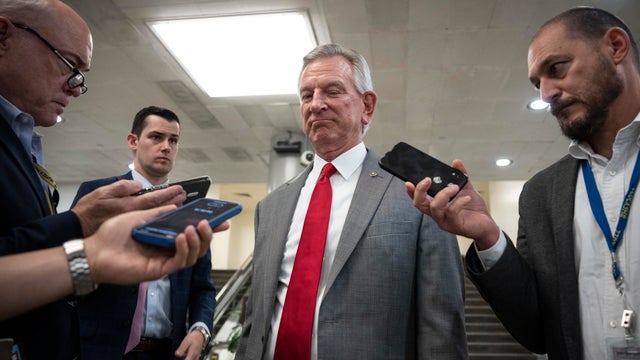Effects from senator's hold on military nominations could be long-lasting

The nominee to be the next top military officer in the U.S. on Tuesday warned there will be widespread impacts because of one senator's hold on military nominations, including losing talent.
Air Force Gen. Charles Q. Brown, whose own nomination to become the next Chairman of the Joint Chiefs of Staff could be held up in the Senate, said during his confirmation hearing Tuesday that the hold creates challenges that affect service members now and into the future.
"We have our more junior officers who will now look up and say if that's the challenge I'm going to have to deal with in the future, I may not want – I'm going to balance between my family and serving in a senior position," Brown said. "We will lose talent because of those challenges."
Republican Sen. Tommy Tuberville of Alabama has placed a hold on general and flag officer nominations to protest the Defense Department's policy that covers certain abortion-related travel expenses for service members based in states with restrictive reproductive healthcare laws.Tuberville is exercising the hold until the Pentagon changes the policy or it is passed through legislation.
Because of that hold, the Marine Corps is operating without a Senate-confirmed commandant for the first time in 164 years. Gen. David Berger relinquished office Monday to assistant commandant Gen. Eric Smith. Smith has been nominated to be commandant, but until the Senate confirms him, he will continue to serve as assistant commandant as well as acting commandant.
Other positions on the Joint Chiefs of Staff face a similar prospect. Over the next several months, the chief of staff of the Army, the chief of Naval Operations, and the chairman of the Joint Chiefs of Staff are statutorily obligated to leave their posts. On top of that, the Senate will have to confirm the next Air Force Chief of Staff to replace Brown when he becomes chairman.
The Pentagon estimates that the hold could impact 650 nominations by the end of the year.
"We're looking at about 89% of all general and flag officer positions that could be vacant or require a Senate confirmation, again, at a time when we are facing rising challenges from all around the world," Pentagon deputy press secretary Sabrina Singh told reporters Monday.
Tuberville has said he's not against voting on the nominees one by one and would even vote in favor of many of them, but there are hundreds of military promotions that are usually approved by the Senate in large blocs by what's known as "unanimous consent" or voice vote, which takes far less time than a regular floor vote. Democrats argue holding individual votes on the military promotions and nominations would be nearly impossible to do because of the time it takes to vote when one senator's hold is blocking the unanimous consent process.
Democratic Sen. Jack Reed of Rhode Island, the chair of the Senate Armed Services Committee, said on the Senate floor Monday that because Tuberville's hold forces the Senate to invoke cloture on each nominee, the Congressional Research Service estimates it would take 668 hours to confirm the 251 nominations currently pending – 27 days if the Senate works around the clock and 84 days if they work 8 hours a day just on the military nominations.
Senate Majority Leader Chuck Schumer told reporters on Tuesday that Tuberville is "risking military security." He said other Republican leaders, such as Minority Leader Mitch McConnell and Whip John Thune, need to "put the pressure on [Tuberville] to back off."
If senators wanted to confirm the most senior officers like the chairman of the Joint Chiefs of Staff, they could vote on each nominee individually, but they have so far chosen not to do so. Defense Secretary Lloyd Austin warned that allowing Tuberville to effectively change the way the Senate votes on military promotions would be dangerous.
In a letter to Sen. Elizabeth Warren in May, Austin wrote, "Never before has one Senator prevented the Department of Defense from managing its officer corps in this manner, and letting this hold continue would set a perilous precedent for our military, our security, and our country. The ripple effects of this unprecedented and unnecessary hold are increasingly troubling. Ultimately, the breakdown of the normal flow of leadership across the Department's carefully cultivated promotion and transition system will breed uncertainty and confusion across the U.S. military."
CBS News reporter covering the Pentagon.
source: https://www.cbsnews.com/news/tommy-tuberville-military-nominations-hold-charles-q-brown-senate-armed-forces-committee/